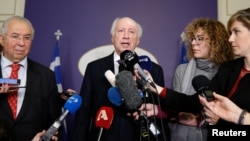A U.N. special envoy urged Greece and Macedonia on Tuesday to seize on momentum in talks to resolve a name dispute straining relations for a quarter of a century, saying the two sides now appeared "energized" to reach an accord.
Athens says Skopje's use of "Macedonia" as its name could imply a territorial claim over the northern Greek province of the same name, and a claim to its national heritage. Skopje counters that Macedonia has been its name dating to the now defunct Yugoslav federation of which it was part.
The 25-year-long dispute has posed an obstacle to Macedonia's ambition to join both the EU and NATO.
"Everyone knows what the issues are. There is a time for decision-making, and I think we are there," said Matthew Nimetz, U.N. special envoy on the "Macedonia" dispute since 1999.
"I know the [Greek] government is very sincere and energized to reach a solution to the problem ... I think there is a will here, and I think also in Skopje, to try to reach a settlement," he told reporters in Athens.
The two countries recently agreed to intensify talks. Still, there is mounting public sentiment in Greece against any deal which could include the name Macedonia. Greece has said a compromise could include a compound name with a geographical or chronological qualifier, and be known only by that name.
Greek Prime Minister Alexis Tsipras has so far failed to secure broad backing from political parties for a settlement which would include the contentious name.
"I think waiting, slowing things down doesn't make any sense. Here it doesn't make any sense, and in the northern neighbor it doesn't make any sense [either]," Nimetz said.
Athens may submit an outline of its proposals to Skopje and the United Nations next month, Greek Foreign Minister Nikos Kotzias told state television on Monday night.
Until the issue is resolved, Greece has agreed only that its Balkan neighbor be referred to internationally as the Former Yugoslav Republic of Macedonia (FYROM), the name under which it was admitted to the United Nations in 1993, two years after Skopje won independence from Yugoslavia.
ATHENS —





